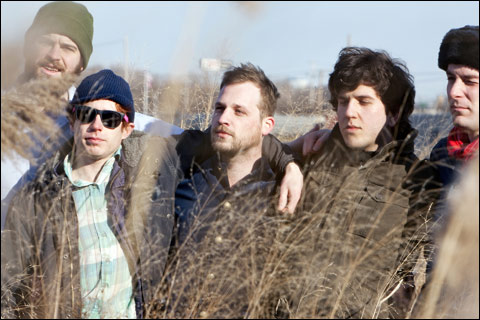
KEEP IT REAL “The more I’ve grown up,” says Scott McMicken (second from left), “the more I’ve realized the slippery nature of honesty, and the need for it in everything that you do.” |
A tip for bands out there trying to impress people with blogs: when choosing the decade you’d like to be mistaken for hailing from, choose wisely. The naughts are still too fresh to ape; the ’90s are hot but risky; the ’80s were picked over by the naughts; there’s nothing left of the ’70s; and the ’60s . . . well, gosh — what are you, some kind of history professor?
“Honestly, what is newness?” Scott McMicken asks somewhat rhetorically from Dallas. Over 10 years and six albums, his band — the Philly five-piece Dr. Dog, who play the Paradise Tuesday and Wednesday — have made it clear that they’ve chosen the ’60s. And since this kind of consistency is currently about as unfashionable as that decade, it’s been a rough go avoiding revivalist tags. “Show me an example of this thing that we continually ignore in our æsthetic. I’m not really sure what we’re leaving out!”
Like many other folks just trying to write a song without constantly hearing about their debt to the past, McMicken is unashamed of his place in the larger narrative. As with any tree, the course of pop history may be steered by its splits and deviations, but its strength comes from the thickness of its roots. This is my roundabout way of saying that Shame, Shame, Dr. Dog’s newest album (and their first for Anti-), sounds kind of like it’s from the ’60s.
But it also sounds kind of fancy and new. In an effort to find greater success tracking live as a band than they had met with in their home studio (whence all other Dr. Dog material hath sprung), they went to NYC to record with famed Beck/Elliott Smith producer Rob Schnapf. Although their bro-down was generally cool, the pace was not, and the studio environment — complete with the new dynamic of having a producer — made their limited time even more limiting.
“It wasn’t the kind of environment where we were free to be grabbing at the console,” McMicken recalls. “We were not encouraged to do that — which is exactly what we’ve always done.”
When time was up, the band had an unfinished album of (albeit incredibly hi-fi) frameworks, which they duly disassembled and dissembled upon getting home. The last two months of Shame, Shame’s conception were split between subtracting gloss and adding layers. For all this experimentation and adjustment, the end product still sounds a lot like Dr. Dog — only better. If they frequently give away their trusty penchant for the Beatles and the Beach Boys, the shiny new surfaces make it easier to see reflections of the present: “Unbearable Why” carries the regional twang of Guided by Voices; the Flaming Lips cast a shadow over “Shadow People”; and any fan of Jack Peñate’s smoky soul would dig the Rhodes and tumbling drum machines of “Someday.” Point being, there are some really nice trees not being seen for this familiar forest.